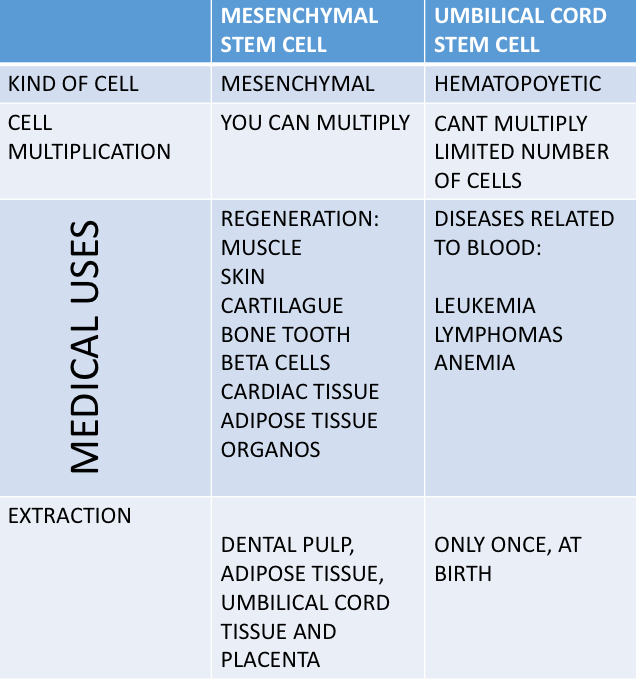What are stem cells?
Also known as core cells (derived from the English stem cells) are defined as undifferentiated cells, capable of making identical copies of themselves. Stem cells can be differentiated when required in various cells of the body with specific functions (heart, liver, kidney, pancreas, etc.).
What are mesenchymal stem cells?
They are cells that are found in different areas of the body (dental pulp, adipose tissue, placenta and umbilical cord tissue) and can be differentiated into organs and tissues of the body.
What are mesenchymal stem cells for?
It is considered that mesenchymal stem cells can be used in the regeneration of organs and tissues of our body, for example: bone, cartilage, ligament, muscle, tendons, skin, insulin-producing cells, cardiac cells, neural cells, retina cells, dental tissues, among others. They can be used in the treatment of diseases such as:
- Diabetes type 1
- Myocardial infraction
- Parkinson
- Alzheimer
- Amyotrophic Lateral Sclerosis
- Spinal cord injuries
- Brain injuries caused by vascular events
- Diabetic foot
Is this kind of treatment made in Mexico?
There are several protocols that are currently being carried out in Mexico, which are in the process of authorization for their clinical application. Mesenchymal cells obtained from other parts of the body have already been used with great success in combination with hematopoietic cells in bone marrow transplants, reducing side effects and the use of immunosuppressants.
What tissue can be used to obtain mesenchymal stem cells?
Dental nerve or dental pulp
Adipose tissue
Placenta
Umbilical cord tissue
How long do the cells last after being processed?
After the cryopreservation process, the biological activity stops; as a result, cells that are processed in an appropriate manner can be stored almost indefinitely. Human cells have effectively been stored for up to 50 years.
Until what age can I store my stem cells?
Although there is no age limit to save your cells, the younger the cells, the greater the chances of success in the process and the better quality of the same.
What differences are there between mesenchymal stem cells (dental Pulp, adipose tissue, placenta and umbilical cord) and the umbilical cord blood or peripheral blood?

It is important to note that some do not replace the others but can be supplemented. In fact, they are used together in bone marrow transplants where mesenchymal cells efficiently modulate the response of the immune system, favoring the acceptance of hematopoietic (umbilical cord) cell transplantation.
What guarantee do I have when hiring with Store a Cell?
The laboratory in which the Store a Cell processes are carried out has a license from Cofepris authorized for the disposal of organs, tissues and cells for therapeutic purposes in the form of progenitor cell bank.
The preservation of the cells is guaranteed for the contracted time, even if the company stops offering this service.
The cells are deposited in four different containers as an additional guarantee.
Our laboratory has validated its process of isolation, transport, culture and cryopreservation of dental stem cells together with the Institute of Biomedical Research of UNAM, with whom an official joint research agreement has been established. Our laboratory has validated its process of isolation, transport, culture and cryopreservation of dental stem cells together with the Institute of Biomedical Research of UNAM, with whom an official joint research agreement has been established.
Where can I get full information regarding the Store a Cell service?
For more information, call:01 55-5202-9828; or send an email to servicioaclientes@storeacell.com; or, if you like, a representative can visit you in your home or office.
